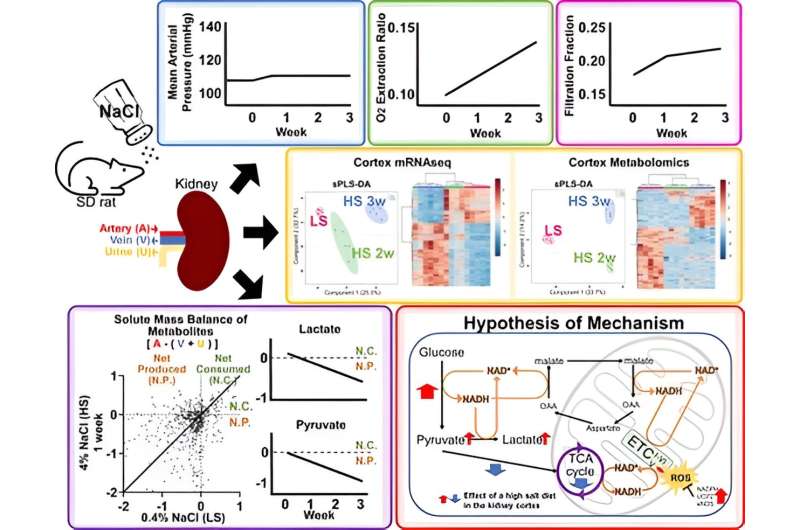This article has been reviewed according to Science X's editorial process and policies. Editors have highlighted the following attributes while ensuring the content's credibility:
fact-checked
trusted source
proofread
High-salt diet in rats slows metabolism and energy production of kidneys

Some parts of the metabolic pathway (the process of turning food into energy) slow in response to a high-salt diet, even as the kidneys produce and use more energy when exposed to high salt intake. The surprising finding is documented in a new research study by first author Satoshi Shimada, Ph.D., in the journal Function. Shimada and other researchers from the Medical College of Wisconsin and Jackson Laboratory in Bar Harbor, Maine, noted this result is similar to what happens in malignant tumors.
Consuming too much salt can increase your blood pressure and lead to health problems. Some people are salt-sensitive, which means they are especially vulnerable to sodium. Kidney function has a distinct job in determining how sensitive your blood pressure is to salt. In this study, researchers investigated the effects of a high salt diet on the metabolism and energy production of kidney cells. They recorded responses from more than 20,000 genes and 5,000 metabolites such as carbohydrates, fats and amino acids.
The researchers studied rats with normal blood pressure sensitivity to salt. They were surprised by the findings that many of the metabolite properties had changed to support the kidneys' increased energy needs. "We didn't expect to find a high salt diet would trigger such a response in normal kidneys," said Allen Cowley, Ph.D., senior author of the study.
"It is important for us to understand the mechanism behind this metabolic reprogramming of the kidney when faced with a high-salt diet," Cowley said. Ongoing studies will explore whether metabolic reprogramming is exaggerated in subjects with salt sensitivity, and if metabolic changes account for the high prevalence of chronic kidney disease found in salt-sensitive rats and humans, among other theories.
More information: Satoshi Shimada et al, Metabolic Responses of Normal Rat Kidneys to A High Salt Intake, Function (2023). DOI: 10.1093/function/zqad031




















